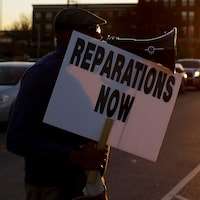Regarding Andrew Delbanco’s Nov. 27 Sunday Opinion essay, “Reparations for Black Americans can work — if they are reimagined”:
Reparations are not about poverty

I am tired of people who grow a keen sense of justice when the topic of reparations comes up and insist payments go to poor people and not be based on race. Reparations are meant to address racist laws and policies that targeted Black people and Native people because of the color of their skin, not because of their poverty.
Deciding who is eligible will be as complicated as our history of racism in this country. Let the descendants of the victims decide who is eligible, not the oppressors. Those who have thrived despite racism, however, should not be penalized. They should get reparations, too.
We should pay African and Native Americans back for the land we stole, the labor we stole, the children we stole, the lynchings, the beatings, the misery, the neighborhoods they were redlined out of, the schools they were Jim Crowed (and redlined) out of, the GI benefits they were cheated out of; the list goes on. It’s not an anti-poverty program. It’s an attempt to achieve some semblance of racial justice and right egregious wrongs.
Andrew Delbanco, in his essay on reparations for Black Americans, wrote about “the mind-boggling price tag attached to any meaningful attempt to give back what was taken away.” I doubt, however, that he actually did the calculation. He referred to the $20,000 given to survivors of the Japanese American internment camps in 1988. (That’s equivalent to more than $50,000 today.) If our country gave $100,000 to every one of today’s 50 million Black and Native Americans, that would be $5 trillion — nearly the amount our government disbursed, with variable regard for need, for coronavirus pandemic relief.
I have not had time to survey my neighbors, but my guess is that if you gave a Black family of four in Baltimore $400,000, regardless of their economic situation, they would appreciate the gesture.






